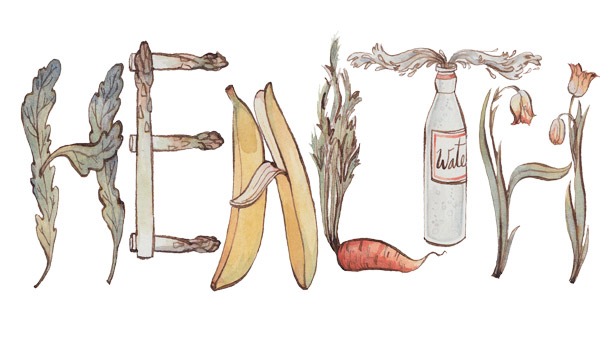Word Play What's in a Word
We don’t know about you, but we love to learn about words — their meanings, their origins, and how they shape our world. In each issue of Response, we ask a campus expert to explore a word related to the magazine’s theme.
 Health (helth) n.
Health (helth) n.
By Luke Reinsma, Professor of English | Illustration by Kelsey Garrity Riley
If the English language is like the Mississippi River, say, with its vast tributaries of the Missouri (Latin) and the Ohio (French) and further confluences strengthening its current, then the word “health” comes from the north, from the river’s source.
It’s in the Middle English. In Chaucer’s riotous “Nun’s Priest’s Tale,” the hen Pertelote urges the rooster Chauntecleer to peck up some laxatives from the barnyard “for youre hele”; 400 years earlier, the Old English monk Ælfric of Eynsham wrote of “ure lichamana hælðe,” of our bodily health. In the meanwhile, in Geoffrey of Monmouth’s Historia Regum Britanniae (1136), we first encounter the familiar phrase “to your health” in the story of Rowan, who entered the banquet hall with a gold cup full of wine and said to her father’s guest, “Lauerd king wacht heil!” — Lord King, to your health!
The word “heil” probably came from the Vikings, who invaded England several centuries earlier and enriched the English language as well — the Illinois River to the Mississippi. In Old Norse, warriors greeted one another with a ves heill — be in good health! — from which comes the word wassail, which has to do with much toasting and festivities.
But if we are to seek out the origin of the word “health,” we must paddle further upstream to its ancestral source in the Indo-European, a long-lost mother tongue spoken about 3000–4000 B.C. somewhere around the Black Sea — the headwaters of the English language. Except back then the word was, perhaps, kailo, “whole, uninjured, of good omen.” Thanks to systematic (mis) pronunciation, kailo spawned plenty of h-words: hale, thus wholesome; the Old English halgian,
to consecrate; and the related halig, holy. So getting, being, and staying healthy, it turns out, is
sacred. Holy. But for the record, so are Héloïse and Helga. And Olga.
